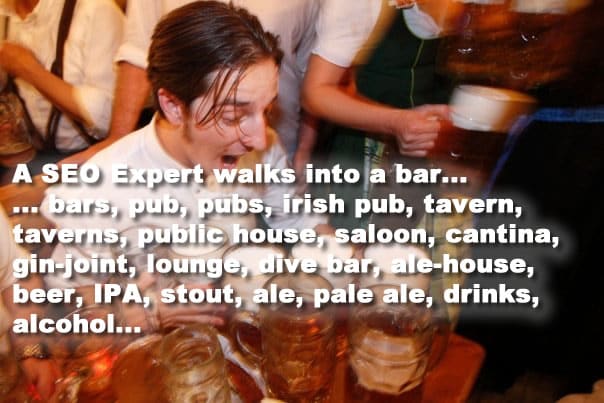Search Engine Optimization has changed a lot in a decade. In April, I’ll celebrate my 10th year as an independent marketing consultant after leaving WeBuildPages (now Internet Marketing Ninjas) in April of 2006. While I’ve been a practitioner for at least a few years prior to that, April will mark the moment I made the leap to accept SEO consulting and internet marketing as my full time work. The roller coaster has been a wild one, and I’ve seen incredible growth, and an industry that’s become much more than cottage, as well as the fallout from those that thought it was all going to be easy and last forever.
While many things change, it seems that everything that is old is new again as well. SEO is dead, Viva la SEO. Keywords and tags are dead, but we still need keywords…and tags. Keywords have always been important to search marketing, but there seems to be a growing number of pitchfork wielders waiting to run keyword research out of town in favor of landing pages, personas, and other things that are supplemental to a good SEO strategy, but have much snazzier acronyms, dashboards, and reporting features since the advent of not provided, and a lack of specific keyword referral data for proper attribution. This constant issue with attribution for organic search is, I’m convinced, at the core of why search marketers want to “kill keywords.”
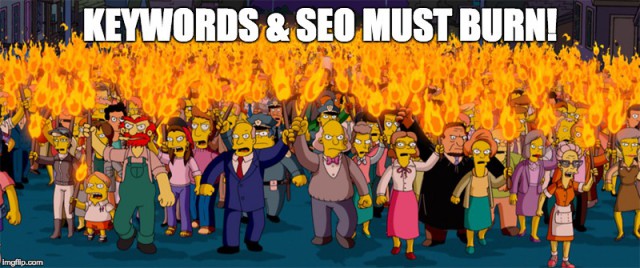 While I’m not quite ready to join the angry mob, I understand the sentiment when reliable organic search volume and cost per click projections are becoming much harder to obtain. Combined with the inability to track keyword referrals in analytics, and we have definitely created an environment ripe for anti-keyword haters. Hey, maybe we got a little carried away with all the keyword stuff(ing), but it doesn’t mean we have to ditch them just because people search with their voices instead of a keyboard, or because user intent personas, and audience data are also valuable to the re-marketing process. While I could continue in defense of keywords, instead, I’ll trail off into a bad SEO joke told long ago…
While I’m not quite ready to join the angry mob, I understand the sentiment when reliable organic search volume and cost per click projections are becoming much harder to obtain. Combined with the inability to track keyword referrals in analytics, and we have definitely created an environment ripe for anti-keyword haters. Hey, maybe we got a little carried away with all the keyword stuff(ing), but it doesn’t mean we have to ditch them just because people search with their voices instead of a keyboard, or because user intent personas, and audience data are also valuable to the re-marketing process. While I could continue in defense of keywords, instead, I’ll trail off into a bad SEO joke told long ago…
What is SEO…
When I started building sites with search in mind, it was quite simple. David Naylor of Bronco.co.uk has one of my favorite quotes on search engine optimization – when asked in 2006 what skills were needed to be a good SEO – he responded –
“Knowing what the search engines want and giving it to them…so hard they f00kin’ bleed.” – DaveN

On SEO Dinosaurs…
 With this same type of “Old School” SEO mentality, I presented some ideas recently on “demystifying search engine ranking factors”. Before I bring some of those same ideas here, I will warn you that I am not Dr Emmet Brown or Steve Mann. I am neither a data scientist from the future, nor a futurist into scientific big data. I’ve read information retrieval and other search ranking type patents, and most of the time they explain a factor in so much depth it feels like my nose and ears are going to start bleeding by the time I’m done.
With this same type of “Old School” SEO mentality, I presented some ideas recently on “demystifying search engine ranking factors”. Before I bring some of those same ideas here, I will warn you that I am not Dr Emmet Brown or Steve Mann. I am neither a data scientist from the future, nor a futurist into scientific big data. I’ve read information retrieval and other search ranking type patents, and most of the time they explain a factor in so much depth it feels like my nose and ears are going to start bleeding by the time I’m done.
In a land back before billions of dollars of PPC ads had been sold, knowledgeable SEO dinosaurs reined the SERPs, and we individually dominated large highly-competitive industries on shoestring budgets with web guerilla like tactics. The ranking factors were kept fairly simple, and an understanding of how they could benefit your site became somewhat common. Each year this knowledge base grew, and the number of webmasters willing to use nefarious methods based on this understanding continued to grow as well.
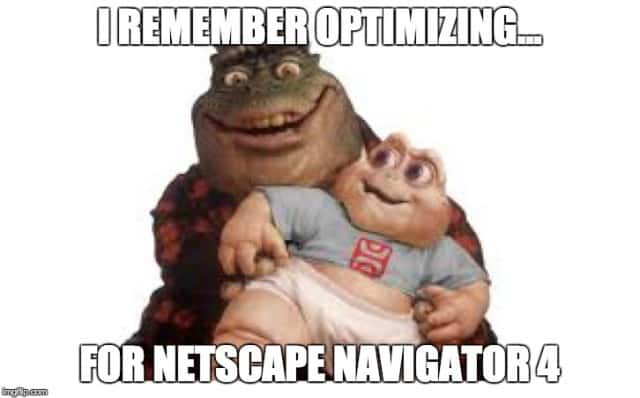 Though many SEO dinosaurs may not know how to “pivot” with an occupational re-brand of “growth hacking” or “inbound marketing”, we do understand the value of first touch point acquisition on commercial intent phrases based on long term domain authority growth initiatives (link building). There is also a sense of camaraderie among those who encountered one another in competitive search results over the years, and a begrudging mutual respect among worthy adversaries.
Though many SEO dinosaurs may not know how to “pivot” with an occupational re-brand of “growth hacking” or “inbound marketing”, we do understand the value of first touch point acquisition on commercial intent phrases based on long term domain authority growth initiatives (link building). There is also a sense of camaraderie among those who encountered one another in competitive search results over the years, and a begrudging mutual respect among worthy adversaries.
These prized search result positions require a knowledge of competitive difference makers that come from an understanding of the most basic of ranking factors – not the most complex. We also spent time in the trenches with proven tactics, and made it through the toughest of google updates with sites still standing to tell the tales. We may have lost an affiliate site or two along the way that , but it was all in the name of experimentation, pushing boundaries, and “seizing every opportunity”.
On Links as a Ranking Factor…
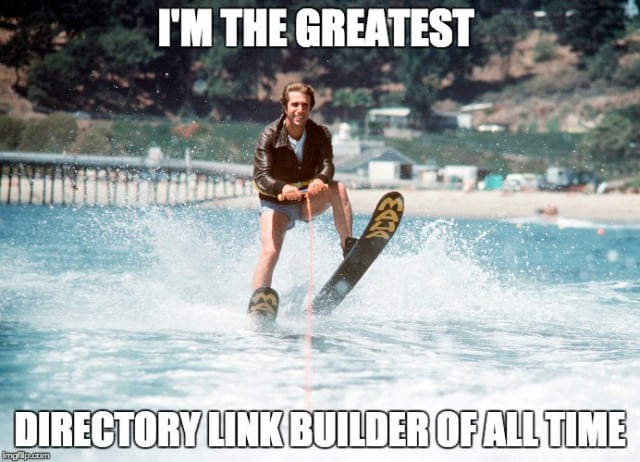 One of the peaks of these manipulative methods was the variety of link building scams developed to “sell shovels to the gold miners during the land rush”. This resulted in things like the Stanford Daily selling links, google banning itself, link selling blog networks, link wheels, and various other link schemes. Like with many a get rich quick or ponzi scheme, those looking for the quick easy cash were left out to dry when penguin updates finally rolled out, and decimated their shortsighted techniques.
One of the peaks of these manipulative methods was the variety of link building scams developed to “sell shovels to the gold miners during the land rush”. This resulted in things like the Stanford Daily selling links, google banning itself, link selling blog networks, link wheels, and various other link schemes. Like with many a get rich quick or ponzi scheme, those looking for the quick easy cash were left out to dry when penguin updates finally rolled out, and decimated their shortsighted techniques.
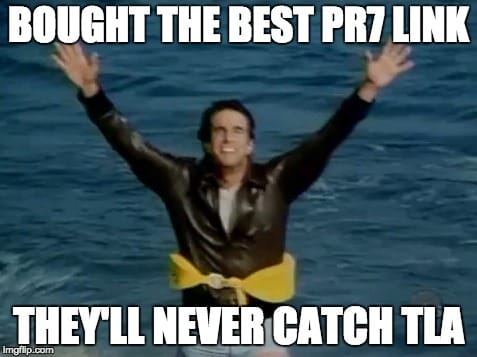 These techniques were born from the need for what I call “funding a site’s link equity”. This idea is based on the fact that your site NEEDS domain authority to rank. Yes, you can do very well with great content for a variety of phrases, but it is very rare that your site will dominate for competitive short tail phrases without having exceptional authority built from your inbound linking profile. Content marketing is the asset, and stories are the currency that fund your site’s link equity. If you can’t talk about your business on your website, you won’t last long against your competitors who can. If you have to pay someone else to write and speak about your business, you are probably in trouble.
These techniques were born from the need for what I call “funding a site’s link equity”. This idea is based on the fact that your site NEEDS domain authority to rank. Yes, you can do very well with great content for a variety of phrases, but it is very rare that your site will dominate for competitive short tail phrases without having exceptional authority built from your inbound linking profile. Content marketing is the asset, and stories are the currency that fund your site’s link equity. If you can’t talk about your business on your website, you won’t last long against your competitors who can. If you have to pay someone else to write and speak about your business, you are probably in trouble.
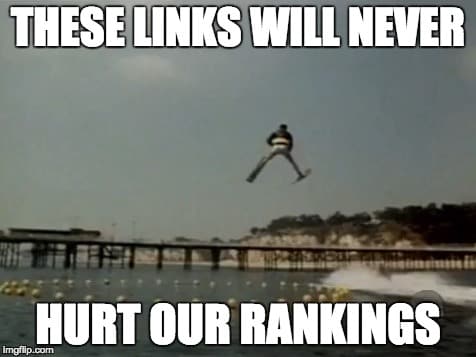 Many of the simplest searches ranking factors of 2005 seem to still be very much alive in the core algorithm of today according to the opinions of most search marketing folks. In addition to these more simple factors, there are many additional filters, checks, and signals that have been put in place to keep search engine manipulation at bay.
Many of the simplest searches ranking factors of 2005 seem to still be very much alive in the core algorithm of today according to the opinions of most search marketing folks. In addition to these more simple factors, there are many additional filters, checks, and signals that have been put in place to keep search engine manipulation at bay.
These checks and signals have served as a distraction to obfuscate common language and important terms in search engine optimization language. Since G has no plans for SEO standardization, it is strange that we often rely on their language and terminology as the accepted standard for update naming conventions and concepts.
Off-Site equity (link authority) has definitely been the most consistently important ranking factor that webmasters are able to directly influence, but it has come with a fairly high cost as the level of risk and volatility associated with individually abused tactics like purchasing links, or directory links. Danny Sullivan has an excellent quote comparing links to fossil fuels. I would add further the analogy…”while fossil fuels might burn dirty, gas still gets my car to where it’s going, and I really don’t want to be stuck on my couch.” Links may not have always been the cleanest of relevance signals, but they have always been among the most powerful, influential, and critical to achieving those coveted organic positions. Even in our own industry surveys, we agree link building is important, although incredibly tedious.
SEO Terminology and Vocabulary
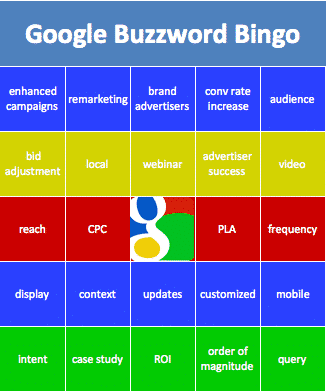
Common vernacular is critical to both understanding a concept, and the standardized testing of it for professional development. One of the biggest hurdles faced by the “SEO Community” today is agreeing on common language without bickering, convoluting, or confusing the conversation.
Something so seemingly simple as “link authority” has several much more complex and perplexing definitions via different tool vendors, educational institutions, or industry experts depending on their agenda. We all want to know how search works – we just want to make it difficult for everyone else to understand, and google certainly wants to keep their black box classified and undecipherable.
This is an issue I faced often when trying to teach SEO at Market Motive – choosing which words and definitions were most commonly accepted, and which practices were acceptable as “best”. It seems both those best practices, and the terminology changed quite quickly, and this creates a unique challenge for staying ahead of the curve on current dynamic and trending topics.
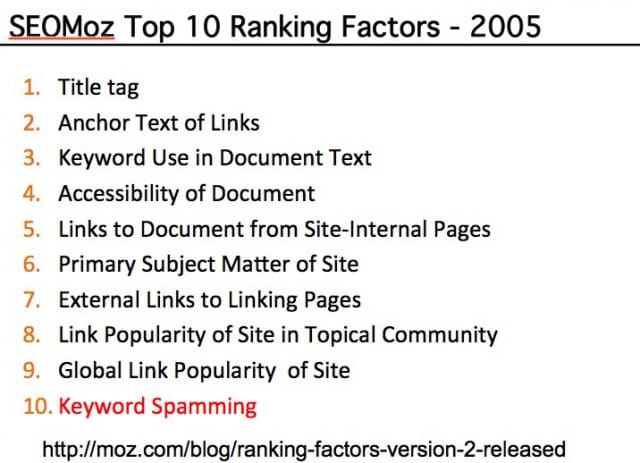 If we look at a list of the ranking factors from 2005 – we can apply an understanding of many of these factors to a strategy and actionable items for building our website website with search in mind. Title tags, body copy, keyword use, internal linking, link popularity are all still high on the SEO checklist for those willing to subject their content and marketing teams to SEO training and make sure they do things like keyword research and competitive analysis before building their products and content.
If we look at a list of the ranking factors from 2005 – we can apply an understanding of many of these factors to a strategy and actionable items for building our website website with search in mind. Title tags, body copy, keyword use, internal linking, link popularity are all still high on the SEO checklist for those willing to subject their content and marketing teams to SEO training and make sure they do things like keyword research and competitive analysis before building their products and content.
It seems where search has become increasingly complex is what google deems as spam, and being better than the other sites in the top 10 with regards to your engagement metrics. These engagement metrics are the filters that keep crappy content from ranking well on high domain authority sites, and was the demise of many a content farm, affiliate website, and thinly veiled lead generation business model.
SEO is still an noun, verb, and adjective. The definition and how it is conducted is heavily dependent on your intent, perception, and past experiences.
Resources on SEO Terminology:
On Signals, Factors, Variables, Filters, and Indicators
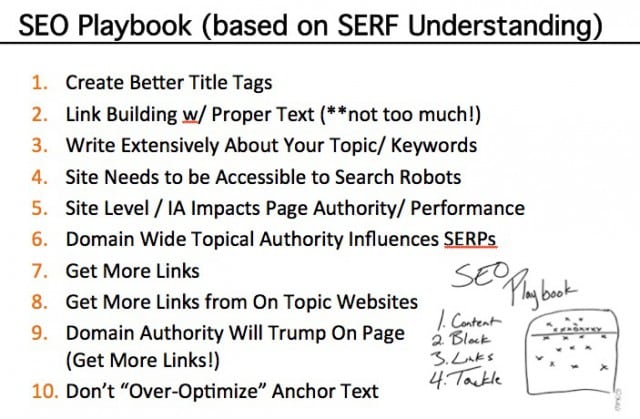 Ranking factors are discussed in a variety of ways. You may hear them referred to as factors, signals, variables, indicators, or other such references. This language, as mentioned, has become somewhat repetitive and redundant, though it is effective in describing some of what google considers when ranking a webpage or site.
Ranking factors are discussed in a variety of ways. You may hear them referred to as factors, signals, variables, indicators, or other such references. This language, as mentioned, has become somewhat repetitive and redundant, though it is effective in describing some of what google considers when ranking a webpage or site.
In the past decade there has been a movement away from tangible tactics of webmasters wanting to rank a website to more scholarly discussion of information retrieval and more scientific studies of what is effective. While the scholarly discussions make for great conversation, and the occasional relevance revelation, they do little to discuss techniques for actionable improvement.
Correlation studies are a great way to understand specific components of a search algorithm and their general trajectory of influence over time, but it’s a little like looking at the bigger trees, and not the forest as a whole. Understanding ranking factors in a vacuum will not help you build a better website.
10 SEO Lessons Learned Over 10 Years.
After a decade of trying to wrap my mind around search ranking factors, I often come back to the same conclusions… If I spend time on things I know will make my site better, faster, more relevant, and better linked, it will perform better in the search results. Keeping even the most basic ranking factors and their influence in mind during the process of creating and improving sites has lead me to these conclusions:
1. Do your keyword research up front. Understand the language in your industry. Spend some time doing some analysis on keyword opposition to benefit ratios (KOB Analysis). Understand the competitive nature of the search results your site is in, and establish reasonable timelines that won’t put you or your team in a bind. It’s much easier to plan a site up front than to retrofit it. Best Practices with URLs, site structure, plugin implementation, security, and other common SEO issues will save time and headaches when the site does start to perform in organic.
2. Don’t change your domain, or a page that’s ranking unless you absolutely have to. Even the best migrations generally suffer from depreciation in link equity (guessed around 20-30%). Creating urls with best practices is a great way to prevent this. If you MUST move things, be certain it’s done right the second time, and follow a proper migration checklist to avoid disaster.
3. Internal linking and architecture defines your website’s relevance and priority. Don’t take away your site footer just because your designer think it looks more minimal and streamlined, or argues it’s better on a mobile phone.
4. Your site information architecture should be a reflection of your understanding of your top converting keywords, as well as the intent and importance of your site’s information intent search phrases. It should follow a proper logical user path from entry to KPI goals in analytics.
5. Never stop writing. Write and re-write your pages, titles, and copy until it’s comprehensive and mercilessly concise. Take notes on ideas, and research and explore your best ideas. Read up on your subject, and write about while documenting your references and inspirations. Always give the shout out where applicable (note the link love in this article as an example).
6. Links matter more than nearly anyone will admit, and most will be gun shy to discuss specific tactics or sites. They’re not easy to get, and doing it the wrong way carries inherent risks. Despite the tedium, your time is well spent understanding your profile, how it relates to your keywords, and developing legitimate tactics for link development. There are very few shortcuts, magic pills, or schemes that work – if they do exist, no SEO in their right mind would tell you about them.
7. Understand your competition IRL and in the search results. Don’t be afraid to talk with, or about your competitors. Mine their backlinks, keywords, content strategy, and anything else you can come across. Find a favorite opponent, and respect your rivals.
8. Social media helps with owning your brand search. SEO Dinosaurs once referred to this as “parasite SEO”, or using someone else’s site to rank for your phrases and refer people to your site. Claim your profiles, and be as consistent as possible. You don’t need to be active on every channel – just present on the ones that best suit your business. If you spend time on social media as a channel, understand the value of asking for the link at the right time when you have the chance.
9. Don’t be afraid to pay for a great domain for any business you are serious about. If you have only a handful of search phrases, you may want to consider that when choosing your domain. Partial match domains are a great bet. Something like TopGunMiami.com is better than MiamiFloridaFishingCharters.com – Associating geo or service keywords with your brand is critical to succeeding for search results with local intent.
10. Managing expectations is critical to succeeding in SEO consulting. There is no magical want to wave, so you need to choose your battles wisely. If you want SEO to work, you need to be patient, diligent, and consistent in your strategy, with the confidence and understanding that the work will pay off with the right approach over time. If you want immediate results and direct ROI attribution, stick to PPC. A multiple channel digital marketing mix will always be the most effective approach to achieving, retaining and benefitting from that hard earned organic traffic.
Each of these rules was developed with an understanding of the factors, and how they influence a site’s search ranking. The idea of a SEO roadmap and timeline has always served me with more value than trying to cater to specific search engine ranking factors (SERFs). The need for links will definitely influence your SEO roadmap, though an understanding of every type of link signal may be beyond the necessary scope of understanding for your average marketing manager who only spends part of their time on SEO.
The Biggest Changes in the Google Black Box – The Core Algorithm.
 There has undoubtedly been some big changes in Google’s search algorithm in the last decade, though most are subtle enough to go un-noticed by the general public, and for most marketing folks for that matter. An update really only becomes an issue when your site is affected, or there is a decline in user satisfaction with search results.
There has undoubtedly been some big changes in Google’s search algorithm in the last decade, though most are subtle enough to go un-noticed by the general public, and for most marketing folks for that matter. An update really only becomes an issue when your site is affected, or there is a decline in user satisfaction with search results.
While we can no longer watch the Google Dance (though the party has been reborn), we do make note of major changes, and modify our roadmaps when necessary. The major changes are noted, documented, and discussed ad nauseum.
The “zoo animal” (penguin/ panda/ pigeon, etc.) craze shook more than a few feathers in the world of SEO, and not all agencies and consultants were left standing. Nothing will teach you what SEO is really like as well as spending long night hours fixing a client site that suffered from a filter, change, or penalty. Combined with the difficulties in proper attribution, and SEO seems to be a budget line item that just gets swept into the general “digital marketing” umbrella in many organizations. SEO has somehow become a word you whisper, and not one you yell.
While the most discussed change of note recently is definitely “Rank Brain”, or Google’s move towards more AI based search results based on serving “features” based search query intent, and a variety of other factors, this is not something that is entirely new in theory, nor particularly useful in practice. I doubt you’ll find a workaround to “teach the rankbrain” anytime soon though undoubtedly folks are still trying to pitch their services by demonstrating that they understand such complex topics.
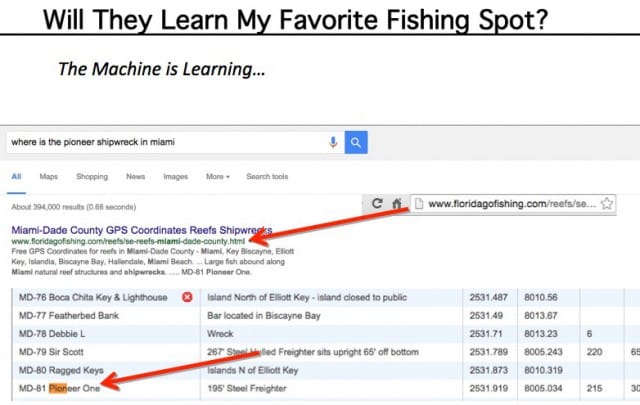 I, for one, welcome our new rankbrain overlords, as I have created my websites with sufficient text, image, and video content for them to learn what my site is about. We often forget that while things are changing, the WWW is still very heavily text based. Futurists would like you to buy into the new technology, but the truth is most of the world are tech laggards – not early adopters.
I, for one, welcome our new rankbrain overlords, as I have created my websites with sufficient text, image, and video content for them to learn what my site is about. We often forget that while things are changing, the WWW is still very heavily text based. Futurists would like you to buy into the new technology, but the truth is most of the world are tech laggards – not early adopters.
Don’t be in a hurry to kill those keywords just yet. The algorithm needs to scrape that content from somewhere to place it in the knowledge box, I just hope they don’t find my favorite fishing spot anytime too soon. There’s enough boats in Miami fishing it daily already.
There is no doubt a lot of science, math, and AI fun going on behind the scenes in the google black box, but the most important factor we can have some influence on is Click Through Rate (CTR). While it has taken some time for this to become a reliable ranking factor, it is noted as the factor with the highest correlation to top organic rankings (searchmetrics study). SEO types don’t agree on a lot, but they do agree that CTR is a significant factor in achieving and maintaining strong search result positions.
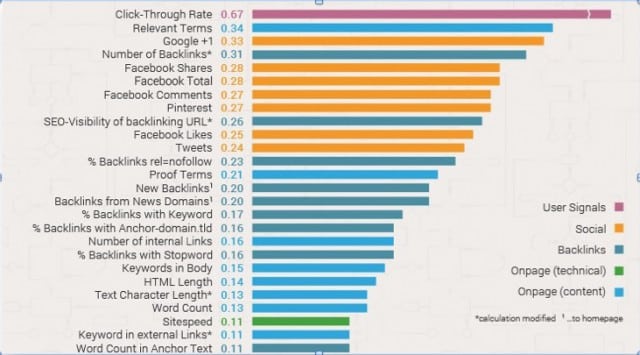 This is not something we necessarily influence directly as it will always be up to the search users, but the verbiage in our titles, descriptions, and body copy will play a role in improving our standings for this significant ranking factor. It makes a lot of sense these days to split test PPC titles, and apply this understanding of the best titles to your organic landing pages. While average written content has become a commodity, the value of compelling consistent A+ content marketing and storytelling has never been greater.
This is not something we necessarily influence directly as it will always be up to the search users, but the verbiage in our titles, descriptions, and body copy will play a role in improving our standings for this significant ranking factor. It makes a lot of sense these days to split test PPC titles, and apply this understanding of the best titles to your organic landing pages. While average written content has become a commodity, the value of compelling consistent A+ content marketing and storytelling has never been greater.
The influence of CTR is demonstrated nearly nowhere better than with the idea of pogosticking or “time to long click” as a secondary metric of engagement. We use these terms in tandem when speaking about “engagement metrics” along with time on site, and some other factors that we can actually measure with analytics.
I like to think of engagement metrics as a bit of a “re-ranking” factor, though that is not exactly the case. Obviously a new page has no engagement metrics, therefore it needs an “audition phase” to test the page’s performance relative to other pages in the search results. If a page performs well, it maintains a position in the top XX search results. If it does not perform well, it is sent off to the oblivion of page 2 or deeper. Audition phases are not always easy to get in a competitive search result. A successful organic landing page must attract and retain users to maintain a position at the top of the search results.
The unfortunate part about engagement metrics, is that there is little in the line of studies to identify what “good” engagement metrics are. Something like time on site can be an indicator of quality, though it is possible users are spending more time on the site because it is confusing. You can see quickly how an understanding of ranking factors is conditional on an understanding of a multitude of terminology and requires a holistic digital marketing skill set to be able to even participate in a discussion.
4 Dimensions of SEO
A recent conference in Miami, SEW Connect, allowed me the opportunity to speak on “demystifying ranking factors”. I really enjoyed the title, and figured it was a good chance to rant about search, and show some fishing photos, so I put together this deck which is (my first on slideshare).
In this presentation I attempted to illustrate that an understanding of a variety of factors and how they work together is fundamental to an understanding SEO and creating a viable strategy. Though this understanding is important, it’s also critical to not get too overwhelmed by the science, and focus on how the takeaways and most influential factors help someone to create an optimal strategy that evolves with only the most major of changes, and doesn’t cause organic traffic declines.
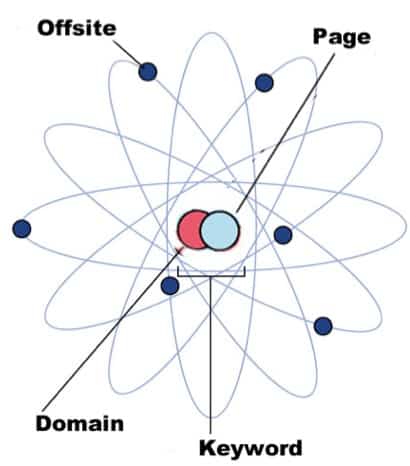 While there are over 200 documented ranking factors, I have always liked to start with 4 dimensions of SEO. I prefer the terminology dimensions (despite the ambiguity created by analytics), because it implies that any factor may be a part of one or more of these dimensions. I’ve chosen this terminology, as it sounds much less linear than how they are often referred to as “levels”. Despite this, I find the two somewhat interchangeable during SEO discourse.
While there are over 200 documented ranking factors, I have always liked to start with 4 dimensions of SEO. I prefer the terminology dimensions (despite the ambiguity created by analytics), because it implies that any factor may be a part of one or more of these dimensions. I’ve chosen this terminology, as it sounds much less linear than how they are often referred to as “levels”. Despite this, I find the two somewhat interchangeable during SEO discourse.
I’ve established this idea of 4 dimensions of SEO after having many a conversation with many an inquisitive business owner or uninitiated marketer long before they fell down the SEO rabbit hole. Search engine ranking factors have changed a lot over time, but how we create websites with search in mind has been fairly consistent. Don’t throw away those keywords just yet. Use them as an understanding for how you should create your SEO and digital marketing roadmaps based on the understanding of how search engine ranking factors work in determining search results. These are some of the many lessons I’ve learned…along with how to drink copious amounts of beer in late night discussions with many of you SEO types. Viva la SEO.


